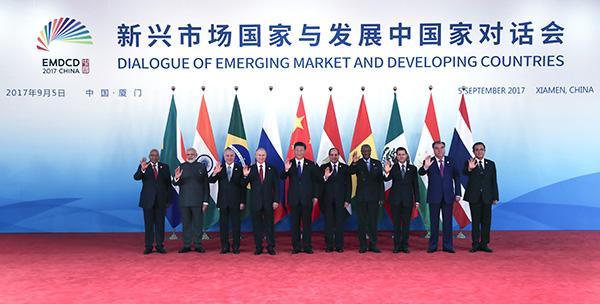新兴市场国家与发展中国家对话会主席声明
Chair’s Statement of the Dialogue of Emerging Market and
Developing Countries
2017年9月5日,厦门
Xiamen, September 5, 2017

2017年9月5日,新兴市场国家与发展中国家对话会在金砖国家领导人厦门会晤期间举行。会议由中华人民共和国主席习近平主持,金砖国家成员国巴西联邦共和国总统特梅尔、俄罗斯联邦总统普京、印度共和国总理莫迪、南非共和国总统祖马,受邀的阿拉伯埃及共和国总统塞西、几内亚共和国总统孔戴、墨西哥合众国总统培尼亚、塔吉克斯坦共和国总统拉赫蒙、泰王国总理巴育出席会议。
On
5 September 2017, the Dialogue of Emerging Market and Developing Countries took
place on the margins of the BRICS Xiamen Summit. It was chaired by President Xi
Jinping of the People’s Republic of China and attended by President Michel
Temer of the Federative Republic of Brazil, President Vladimir Putin of the
Russian Federation, Prime Minister Narendra Modi of the Republic of India,
President Jacob Zuma of the Republic of South Africa, President Abdel Fattah
al-Sisi of the Arab Republic of Egypt, President Alpha Conde of the Republic of
Guinea, President Enrique Pena Nieto of the United Mexican States, President
Emomali Rahmon of the Republic of Tajikistan and Prime Minister Prayut
Chan-o-cha of the Kingdom of Thailand.
领导人围绕“深化互利合作,促进共同发展”的主题,就“落实可持续发展议程”、“建设广泛的发展伙伴关系”进行了深入交流,达成广泛共识。主要包括:
Under
the theme “Strengthening Mutually-Beneficial Cooperation for Common
Development”, the Leaders had in-depth discussions and reached extensive
consensus on implementing the 2030
Agenda for Sustainable Development and
building broad partnerships for development, the major points of which are summarized
as follows:
领导人认为,过去几十年,新兴市场国家和发展中国家积极探索符合本国国情的发展道路,取得举世瞩目的成就。特别是近年来,这些国家发展势头稳定向好,已成为全球经济增长的重要引擎,为促进各国共同发展、完善全球治理作出重要贡献。
The
Leaders pointed out that emerging market and developing countries have actively
explored development paths suited to their respective national conditions and
made remarkable achievements over the past decades. Particularly in recent
years, these countries have maintained sound momentum of steady development,
serving as important engines of global economic growth and making important
contribution to the common development of all countries and the improvement of
global governance.
当前世界经济经历深刻调整转型,新兴市场国家和发展中国家面临的机遇与挑战并存。和平发展、合作共赢成为时代潮流,世界经济呈现温和复苏势头。同时增长动能不足、治理滞后、发展失衡等矛盾依然突出,保护主义上升、“反全球化”思潮抬头令人忧虑。新兴市场国家和发展中国家需要加强团结合作,维护共同利益,努力营造良好外部环境。
As
the world economy is undergoing profound adjustment and transformation,
emerging market and developing countries face both opportunities and
challenges. On the one hand, peace, development and win-win cooperation remain
the trend of the times, and the world economy has shown signs of mild recovery.
On the other hand, serious challenges persist, such as weak growth drivers,
inadequate global governance and development imbalances, as well as worrying
trends of rising protectionism and growing backlash against globalization. It
is necessary for emerging market and developing countries to strengthen
solidarity and cooperation so as to safeguard their common interests and create
a favorable external environment for development.
领导人赞赏近年来金砖国家本着开放包容、合作共赢的精神,同其他新兴市场国家和发展中国家开展对话合作的努力,欢迎和支持中方提出“金砖+”合作模式。这一模式为新兴市场国家和发展中国家合作创造了重要机遇,有助于加强南南合作和国际发展合作,构建更加广泛的伙伴关系网络,推动实现公平、开放、全面、创新发展。
The
Leaders appreciated the efforts made in recent years by BRICS countries in
pursuing dialogue and cooperation with other emerging market and developing
countries in a spirit of openness, inclusiveness and win-win cooperation. They
welcomed and expressed support for the “BRICS Plus” cooperation proposed by
China, which provides important opportunities for cooperation among emerging
market and developing countries, and helps strengthen South-South cooperation
and international development cooperation and build broader partnerships for
fair, open, all-round and innovative development.
领导人强调,2030年可持续发展议程规划了国际发展合作的新蓝图。全面落实2030年可持续发展议程,对推进世界和平与发展事业、构建人类命运共同体具有重要现实和长远意义。国际社会应切实将政治承诺转化为具体行动,携手走上创新、协调、绿色、开放、共享的可持续发展之路。
Stressing
that the 2030 Agenda for
Sustainable Development offers
a new blueprint for international development cooperation, the Leaders believed
that its full implementation will be of important immediate and long-term
significance to peace and development around the world and to the pursuit of a
community of shared future for mankind. The international community needs to
translate political commitments into concrete actions in real earnest, and
jointly embark on a path toward innovative, coordinated, green, open, shared
and sustainable development.
各国应承担起落实可持续发展议程的首要责任,将可持续发展议程同本国发展战略有机结合,增强发展内生动力,推动经济、社会、环境三大领域协调发展,为自身发展和国际发展合作营造良好政策环境。优先做好消除贫困、促进增长、扩大就业等工作,使发展成果惠及全体人民。发达国家应切实履行官方发展援助承诺,加大对发展中国家支持。
It
is important for all countries to shoulder their primary responsibility for the
implementation of the 2030
Agenda for Sustainable Development and
integrate it into their national development strategies, so as to boost endogenous
drivers for development and promote coordinated development in all three
dimensions – economic, social and environmental, and to create an enabling
policy environment for national development and international development
cooperation. Priorities should be given to poverty eradication, growth
promotion and job creation to ensure that everyone share in the benefits of
development. Developed countries should fully honor their Official Development
Assistance (ODA) commitments and increase support for developing
countries.
新兴市场国家和发展中国家应加强包括南南合作在内的广泛合作,加强宏观经济政策协调和发展战略对接,努力促进基础设施互联互通、工业化、信息化、城镇化、农业现代化等领域合作,实现联合自强、共同发展。领导人对中国等与会方通过南南合作援助基金支持发展中国家发展表示欢迎。
Emerging
market and developing countries need to expand cooperation including
South-South cooperation, strengthen macroeconomic policy coordination,
synergize development strategies, and intensify cooperation in fields such as
infrastructure connectivity, industrialization, IT application, urbanization
and agricultural modernization, so as to achieve common development and gain
strength through solidarity. The Leaders welcomed the efforts by China and
other Dialogue participants to provide support for developing countries through
the Assistance Fund for South-South Cooperation.
气候变化是国际社会面临的共同挑战。应坚持《联合国气候变化框架公约》原则,包括公平原则、共同但有区别的责任原则及各自能力原则,尊重各国国情,全面落实《巴黎协定》。发达国家应向发展中国家提供更多资金、技术及能力建设支持。
Climate
change is a common challenge confronting the international community. It is
important to uphold the principles of the United
Nations Framework Convention on Climate Changeincluding the principles of
equity, common but differentiated responsibilities and respective capabilities,
in the light of different national circumstances, and to fully implement the Paris Agreement. Developed
countries should provide more financial, technical and capacity building
support to developing countries.
全球经济治理应与时俱进,坚持共商、共建、共享原则,提升新兴市场国家和发展中国家的代表性和发言权。各国应致力于建设开放型经济,维护多边贸易体制及其基本原则,反对保护主义,共同推动世界贸易组织第11届部长级会议取得成功,促进经济全球化向更加开放、包容和普惠的方向发展。
Global
economic governance should keep abreast with the times and the representation
and voices of emerging market and developing countries should be enhanced under
the principles of extensive consultation, joint contribution and shared
benefits. All countries need to be committed to foster an open economy, uphold
the multilateral trading regime and its fundamental principles, oppose
protectionism, and jointly work for a successful 11th WTO ministerial
conference to make economic globalization more open, inclusive and beneficial
to all.
各国应支持联合国在国际发展合作中发挥中心作用,对联合国发展系统进行必要改革。改革应以促进发展为核心,以消除贫困为业务重点,坚持成员国主导,广泛听取和回应发展中国家关切。同时,增强联合国协调落实可持续发展议程的效率和能力,加强系统内各机构的协调合作和优势互补,调动更多的发展资源。
It
is important for all countries to support the United Nations in playing a
central role in international development cooperation and in conducting
necessary reform to its development system. This reform should center on
promoting development, prioritize poverty eradication, remain
membership-driven, extensively seek views of developing countries and respond
to their concerns. Meanwhile, the reform should help enhance UN’s efficiency
and capabilities in coordinating the implementation of the 2030 Agenda for Sustainable
Development, strengthen coordination and complementarity among all bodies
within the UN system and mobilize more resources for development.
领导人一致赞赏中国作为金砖国家主席国,举办新兴市场国家与发展中国家对话会,同意继续就落实可持续发展议程、推动国际发展合作保持沟通协调。
The
Leaders expressed appreciation to China for hosting the Dialogue of Emerging
Market and Developing Countries as the BRICS Chair and agreed to maintain
communication and coordination in implementing the 2030 Agenda for Sustainable
Development and promoting
international development cooperation.















